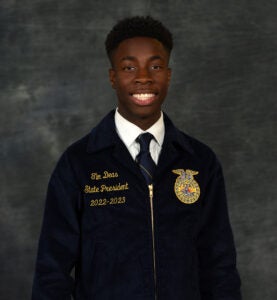The National FFA Organization has a long and rich history in promoting agricultural education to America’s youth and preparing them for a successful future in the agricultural sector. The organization was established in 1928 but did not accept persons of color or women until the 1960s. As recently as 2018, nearly 70 percent of members identified as White, something that the organization is now seeking to better balance.
This drive for change is reflected in FFA’s membership and officers, who are growing more diverse with time.
Tim Deas, the State President for Georgia FFA, is one representative of this change. Despite the Georgia FFA chapter being formed in the 1930s, Deas is only the third ever Black person to hold the position of state president.
A pioneer for change, Deas is aware of the history of FFA’s exclusion, but he believes in the organization’s mission to improve diversity and inclusion in its ranks. He values the opportunities that FFA has provided to him and is excited to see how the agricultural industry in Georgia will change over time.

Part of this change is the expansion of what being in agriculture looks like. Deas is a believer in diversity in agriculture, but he wants to emphasize that there needs to be diversity in what “agriculture” is — not just traditional farming, but also plant science research, ag education, environmental policy, and so much more.
“When minority youth see that agriculture is more than just working on a farm, they can see themselves in these roles, and this will eventually lead to diversity in agriculture,” Deas said.
Dalasia Morrow, a reporter for area II in Louisiana’s FFA chapter, can also attest to this sentiment. Morrow initially joined FFA because she was looking for an “easy” science class to enroll in, and enrolling in an agricultural class meant automatically enrolling in FFA. She had never heard of FFA before, and was not actively participating in her chapter.
It wasn’t until an ag teacher who saw her potential and then pushed her to become more active and participate in events that she began to realize FFA was something she could be interested in.
“If it wasn’t for my teacher who is a person of color like me, I probably wouldn’t have done what I’ve done,” Morrow said.

For her senior year, Morrow hopes to become the next state officer for Louisiana, and continue advocating for minorities in agriculture. As a reporter, Morrow knows the impact that stories can have and hopes to share with other minorities or underrepresented groups that they belong in the agricultural sector in whatever capacity they want to be in.
“Many people don’t pursue careers in agriculture because they don’t see people like them in those roles,” and Morrow hopes that she can change this notion by becoming an agriculture educator.
Both Deas and Morrow spoke about how they saw their state’s agricultural landscape changing alongside the faces of those in agriculture.
“To combat the problems we face today, innovative solutions are emerging,” said Deas, who cites the introduction of greenhouse growers as a new trend that is finding its way to the state.
Georgia’s history in agriculture has proved alluring to innovative ag companies such as Pure Flavor, a Canada-based company who has built a state-of-the-art greenhouse in the state to grow produce.
In Louisiana, a state with a large forestry industry, Morrow commented on seeing more minorities gain jobs at major milling companies such as International Paper, Roy O’ Martin, and Weyerhaeuser.
“I believe that [companies] can be open to change, and they would take reasonable adjustments to save the industry,” she said. This is a much needed openness in the wake of climate change and increasing uncertainty over supply chain issues.
While these two states differ in their agricultural emphasis, the same sentiment of being innovative and open to change rings through both landscapes.
The history of FFA is long and full of changes and progress, reflecting how the farming landscape in America has changed. Today, with more changes needed than ever before to combat the industry’s rising problems, FFA is devoted to sourcing creative, eager youth who are passionate about agriculture and addressing its problems in diverse, scientific, and creative ways.
In many areas, the National FFA Organization and its state and local leadership are showing the youth in America that being in agriculture is not a single, one-dimensional role such as being a farmer, but rather it’s a multitude of career options and paths. By diversifying what the field of agriculture looks like, there will naturally be an increase in the diversity of people who join and work in the sector.
The ripples these FFA youth will spread in the field remain to be seen but will undoubtedly drive the future of this industry to one that is bright and sustainable.
Liza Thuy Nguyen serves as the 2023 American Farmland Trust Agriculture Communications Intern at AGDAILY, with a focus on helping to amplify diversity and minority voices in agriculture. Liza is originally from Anaheim, California, and attended the University of California, Davis, as a first-generation college student. She received a bachelor’s degree in genetics and genomics and went on to earn a master’s in horticulture from Penn State.





